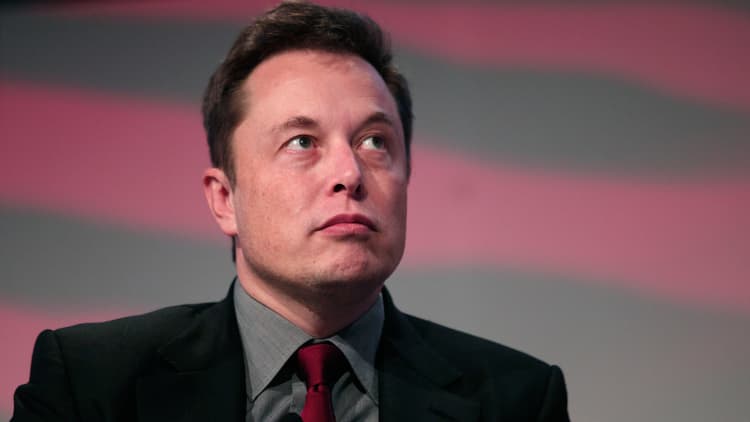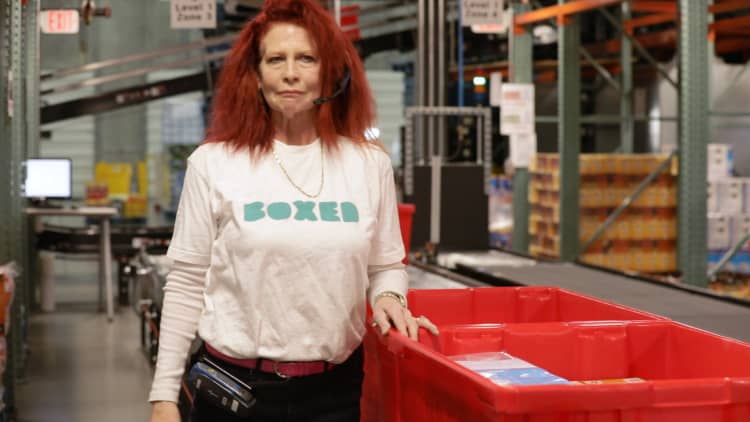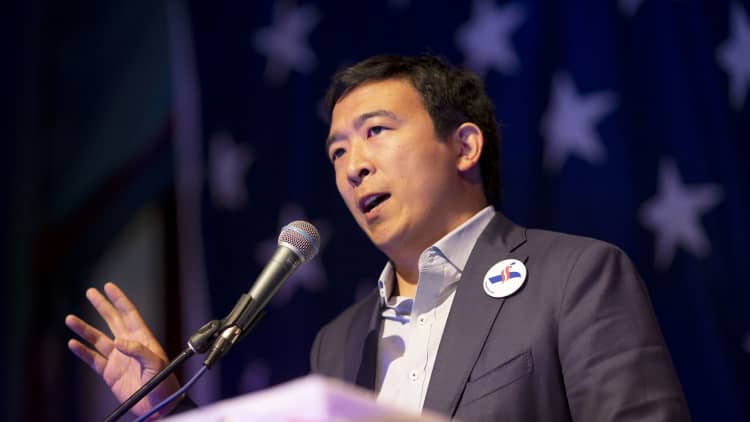For many, the impending 2020 presidential election threatens to bring a barrage of punditry, and everything from acrimony to hope. But for the Fassi family in Goffstown, New Hampshire, it has brought a $12,000 gift of cash.
That's because presidential hopeful Andrew Yang, 43, is running for election on a campaign that centers around the idea of universal basic income, or free cash payments. Specifically, Yang promises that if elected, every American citizen between the ages of 18 and 64 will receive $1,000 a month.
To demonstrate the potential benefit of distributing cash, Yang is personally funding a pilot for cash payments, which he calls the Freedom Dividend.
Jodie Fassi and her family were selected from "dozens of nominations," Yang tells CNBC Make It.
Charles Fassi, 49, his wife Jodie, 47, and their daughter Janelle, 20, received their first $1,000 check from Yang at a New Year's Eve party in New York City, Yang tells CNBC Make It.
Technically, "the pilot is just for one person, Jodie," Yang tells CNBC Make It. (Yang's campaign vision is to give every individual citizen money). "But we ended up meeting the whole family, since Janelle filled out the nomination form, and their family story is so relatable. They are a perfect example of how $1,000 freedom dividend would help families across the country, and the entire family has gotten behind the concept and has agreed to share their experiences," Yang tells CNBC Make It.
The Yang campaign "selected the Fassi family because their story is so compelling and relatable. Millions of Americans will be able to see their own families in the Fassis. What we are doing for the Fassi family we can do for every family in the country," Yang tells CNBC Make It.
Charles lost his job just as their daughter was headed to college. "He lost his job August 11th and she was starting college that week, we had to set up her dorm," Jodie tells New Hampshire Public Radio (NHPR) according to a report published Monday. "I actually had this house on the market. I had his car sold. I just went into protective mode of, 'Okay, well, what do I need to do to keep her in college.'" (Janelle is currently a sophomore at St. Anselm College in in Goffstown, New Hampshire, she tells CNBC Make It.)
Yang announced that he would give out the $1,000 payment in April. Yang is personally paying the $12,000 for the demonstration, he told CNBC Make It then.
Janelle applied for the Yang Freedom Dividend online in 2018, NHPR reports. Yang interviewed the family, and when they were selected, Jodie says her husband was really surprised. "And he actually ended up crying because he felt like we didn't deserve it," Jodie tells NHPR.
Charles has gotten a new job, but is still making less money than he was before. "The stock market's up, businesses are raking in profits, yet people are kind of struggling more and more every day," he tells NHPR. (The stock market has been incredibly volatile in the past year.)
Therein lies the fundamental premise of Yang's campaign, which he has detailed in his book, "The War on Normal People."
"The economic numbers are the numbers, but the average American right now is dealing with a higher degree of financial instability than they've dealt with in generations. Most Americans know that they are not sharing in the wealth and progress of society and that things need to change," Yang told writer Nick Thompson in September.
In particular, Yang says automation is contributing professional displacement and will do so even more in the future. "You'll see fast-food restaurants bringing in more self-serve kiosks and burger-carrying robots. We'll see more companies figuring how to make do with fewer call-center workers. In the next downturn is when the rubber hits the road," Yang tells Thompson.
Tech titan Elon Musk has also said that robots will take so many jobs the government will have to pay people to live. "There is a pretty good chance we end up with a universal basic income, or something like that, due to automation," says Musk to CNBC in 2016. "Yeah, I am not sure what else one would do. I think that is what would happen."

Meanwhile, the World Economic Forum has found that automation will create more jobs than it eliminates. Automation and artificial intelligence will result in 75 million jobs being displaced and another 133 million jobs created, the WEF said in a report published in September. That will result in 58 million net new jobs being created by 2022 according to the report, "The Future of Jobs 2018," CNBC reports.
According to Yang, however, a cash payment will be necessary for people to afford to live through the automation evolution. In addition, a UBI payment would "provide a degree of recognition and compensation for all the work parents and caregivers do, particularly mothers, and it would help bring some equity across gender lines and racial lines," Yang tells Thompson.
To fund such a plan, Yang would impose a value-added tax (VAT) of 10 percent on the goods and services a company produces, he explained to CNBC Make It in early 2018. At the time, Eric Toder of the Washington, DC-based Tax Policy Center, told CNBC Make It that a 10 percent VAT in the United States could raise anywhere from $500 billion to $1 trillion, depending on how broadly the tax is applied.
N.H. Family To Receive $1,000 A Month From Presidential Candidate Running On Universal Basic Income:
Of course, many are against idea of a universal basic income. UBI is expensive, Ian Goldin, a Professor of Globalization and Development at the University of Oxford, told The Financial Times in February. And cash handouts will disincentivise people to work, goes another argument. "Delinking income and work, while rewarding people for staying at home, is what lies behind social decay," Goldin says. "Wherever possible, safety nets should be a lifeline towards meaningful work and participation in society, not a guarantee of a lifetime of dependence."
Before making a run at the White House, Yang was the CEO of the test-prep education company Manhattan GMAT, which industry leader Kaplan bought in 2009. Also, in 2011, he launched Venture for America, a New York City-headquartered organization that trains entrepreneurs in a two-year fellowship program.
Thus far, Yang's campaign is grassroots. He says it has raised "hundreds of thousands of dollars from thousands of donors nationally — with an average donation of only $11," Yang tells CNBC Make It.
Getting busier around the campaign
The Fassi's haven't yet decided what they will do with the cash.
"Just the basic security of having a little extra money, [so] that if the car breaks we don't have to use our credit card, we can actually pay," Jodie tells NHPR. Charles has had entrepreneurial visions. "Even, we were talking about starting our own business," he tells NHPR.
See also:
This 43-year-old running for president in 2020 wants to give everyone $1,000 a month in free cash
This presidential hopeful will give away $1,000 a month to demonstrate the benefit of cash handouts
Robots make life better for workers at Boxed's New Jersey warehouse — and no one has been laid off

Like this story? Like CNBC Make It on Facebook!



